Taylor Wessing, Osborne Clarke and CMS have been caught advertising unpaid roles and jobs for as little as £2.50 an hour.
The adverts, which appear on the European Law Students Association (ELSA) website, offer legal work opportunities for students, graduates and young lawyers. Some of the jobs would appear to do little for social mobility and diversity in the profession, as only candidates who can afford it need apply.
One opportunity that CMS offered in its Budapest office paid HUF 65,000 per month (about GBP 165 a month). That's less than half the minimum salary in Budapest (HUF 150,000 per month) and about a quarter of the average salary in Budapest (HUF 250,000 after tax).
But as a bonus, tea and coffee is provided.
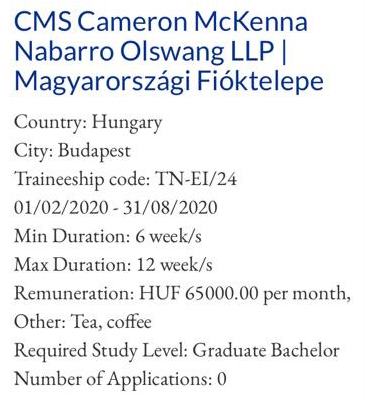
When asked about the meagre pay, a CMS spokeswoman thanked RollOnFriday for flagging the issue (you're welcome) and said "the previous information was incorrect". The firm scrambled to update the advert for the position so that it now pays HUF 220,000 a month. And also chucked in a "fruit day" that wasn't previously mentioned:
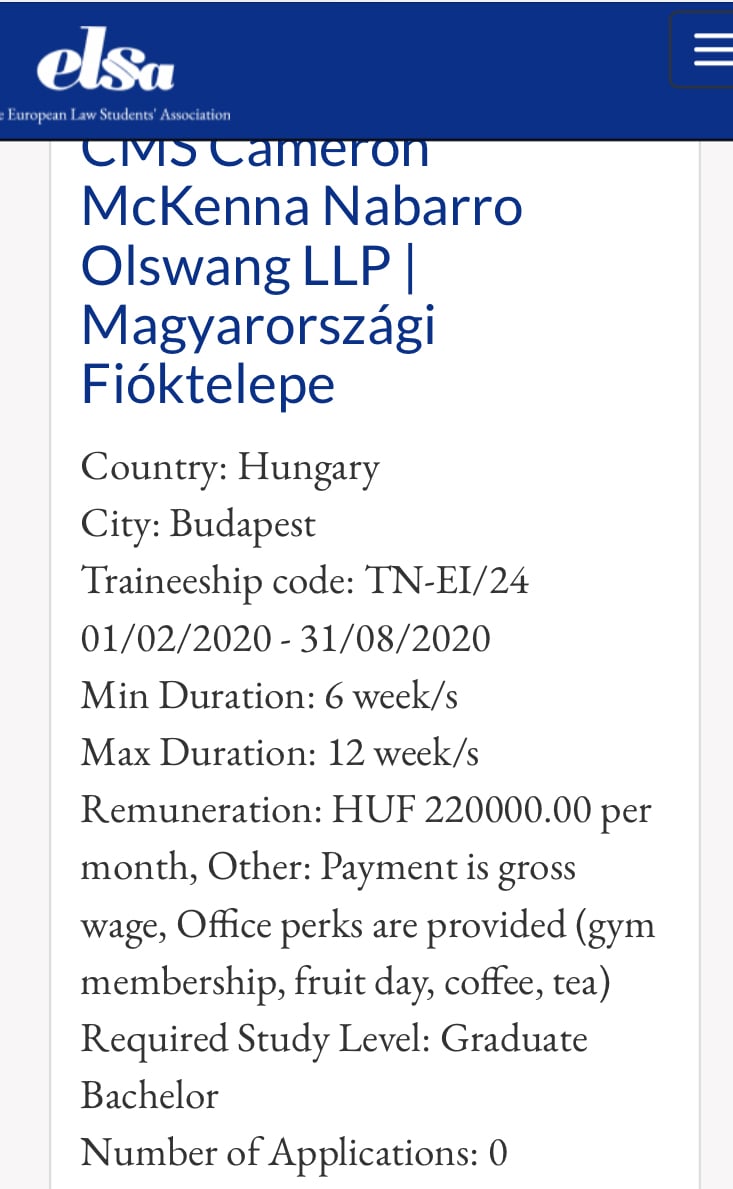

It was RoF wot won it
Taylor Wessing also seemed to take a stingy approach, offering a position in Hungary at HUF 1000 per hour (around £2.50 an hour). That's less than a third of the average hourly wage (HUF 3,659 per hour). On the face of it, it's also less that the minimum wage for professional workers (HUF 1,107.95 per hour) - but aTaylor Wessing spokeswoman told RollOnFriday that the firm pays "more than the minimum wage" and "the confusion may have arisen over net vs gross salary".
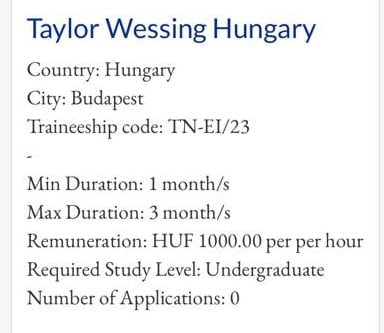
In Prague, Taylor Wessing offered CZK 150 per hour (around £5 per hour). Although more than the minimum wage, it's less than half of the average hourly wage in the Czech Republic (CZK 339 per hour).
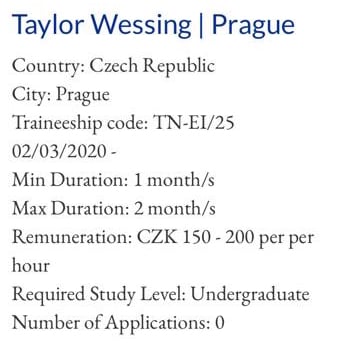
"We were invited to participate in the programme thanks to our longstanding support of the ELSA" Taylor Wessing's spokewoman told RollOnFriday. She added that the programme enables the "development of international students outside of their home country - something which is particularly challenging for students who have no knowledge of the local language or local law." Although they will quickly have to learn the value of the local currency when they understand how little of it they have.
"As with work experience around the world, this can be paid or unpaid," the spokeswoman said. "We've chosen for this to be a paid-for placement". She said that the firm "opted for an hourly rate, as opposed to monthly, so that the students can work flexibly around the demands of their studies" and there there is no obligation to work specific hours. She added that students are "also given full access to our local benefits and training programmes."
At the bottom end of the scale, Osborne Clarke's Brussels office advertised a position as completely "unpaid". Not even a fruit day is mentioned:
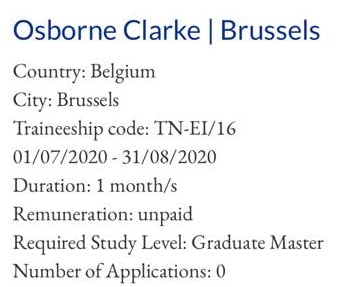
A spokesman for the firm said "our preference is to pay a salary for internships but, in Belgium, the university governs the boundaries for the student experience with the contract drawn up between the law firm and the university."
He said that some universities stipulated that a student must not be paid, other than expenses. "However, where we are able to pay a salary then we do so", he said, adding that some students in the firm's Brussels office were paid under a "professional immersion agreement signed directly between ourselves and the students."
He clarified that "under remuneration on the advertisement you refer to, it should say 'paid or unpaid' depending on university requirements. This will now be changed and we apologise for any confusion":
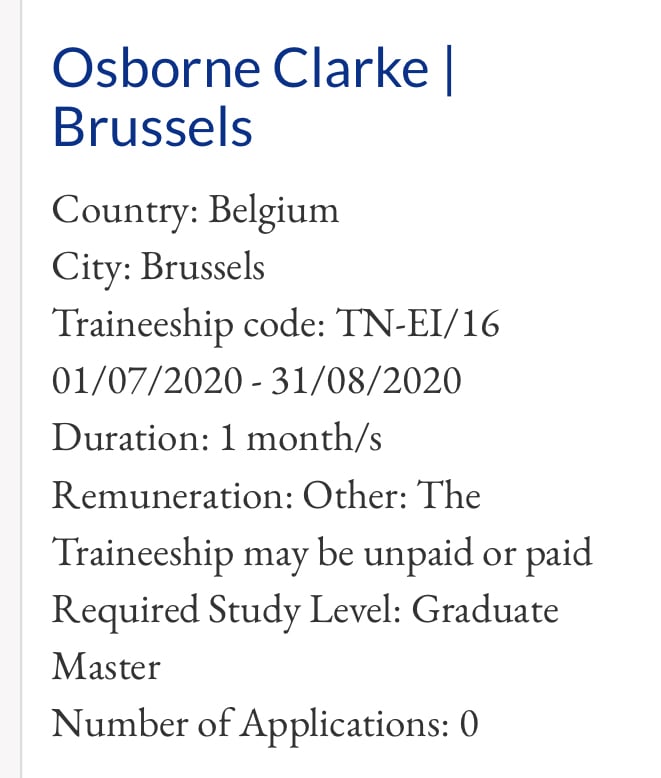
The three firms are not the alone in giving students the shoe-string budget experience.
Whether you're paid £2.50 an hour, or a million a year, RollOnFriday welcomes you to complete the RollOnFriday Firm of the year survey.














Comments
279
281
Breaking news: In a shocking development, different countries have different currencies, different costs of living and therefore different wages accordingly. University students are sometimes placed on unpaid schemes.
Tighten up.
274
289
Think the point is these are called traineeships specifying English speaking graduates only, paying a tenth of what they pay here and below the minimum wage
262
285
Actually these are fair deals in the region for internships. Internships normally last a couple of weeks, students are looking after theese to learn and get experience, not to save for their future... the work that they can do is also very limited... the only cheap thing about this topic is the article above... hope however it get more clicks then these companies are paying.
267
278
I think the point, John, is that many people cannot afford to work for free and so unpaid schemes limit access to the profession.
258
265
Anonymous, yep thats a populist approach, there is four reason why your statement is not right. One is that you make companies responsible for this, while this is a much broader question, second is that these internships are not required to be a lawyer. Foreign internship are definitely not required to be a professionalist, its more about your interests. Fourth, the money offered is actually enough for an air b&b food and travel in these countries. Not in the UK, but in the region it is. So back to my point, populism is not the right answer.
274
251
John, I think you’re missing the point:
1. How are companies not responsible for their salaries? I understand they can’t control wider issues such as cost of living, education opportunities etc, but how much they pay is in their control and paying a living wage is the right thing to do. It also makes business sense.
2. Regardless of whether it is for a legal or non legal position, fee earning or not, paying a living wage (and always the legal minimum!) is the right thing to do.
4. (Can’t see a 3) Are Air B&Bs free in Belgium? And presumably food banks. “We expect our early and emerging talent candidates to show resilience and be self-directed...”
As for ‘populism’, RoF have had a good success rate here increasing the pay, which is a good thing. Part of this is about changing the mindset from ‘we are doing you a favour by allowing you to work for us’ to ‘we value and respect our people and the communities we operate in.’